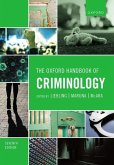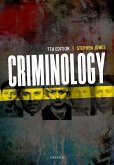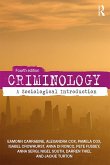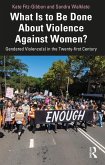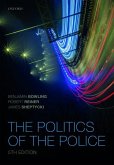What is Criminology?
Herausgeber: Hoyle, Carolyn; Bosworth, Mary
Schade – dieser Artikel ist leider ausverkauft. Sobald wir wissen, ob und wann der Artikel wieder verfügbar ist, informieren wir Sie an dieser Stelle.
What is Criminology?
Herausgeber: Hoyle, Carolyn; Bosworth, Mary
- Broschiertes Buch
- Merkliste
- Auf die Merkliste
- Bewerten Bewerten
- Teilen
- Produkt teilen
- Produkterinnerung
- Produkterinnerung
Specially-commissioned essays by leading international criminologists critically examine criminology's conceptual foundations, aims, methods, boundaries, and impact. Describing the current state of the discipline, this collection is essential reading for all advanced students and academics of criminology.
Andere Kunden interessierten sich auch für
![The Oxford Handbook of Criminology The Oxford Handbook of Criminology]() Alison Liebling (Professor of Criminology and Pro Criminal JusticeThe Oxford Handbook of Criminology47,99 €
Alison Liebling (Professor of Criminology and Pro Criminal JusticeThe Oxford Handbook of Criminology47,99 €![Criminology Criminology]() Stephen Jones (Honorary Senior Lecturer, School of Law, UniversityCriminology62,99 €
Stephen Jones (Honorary Senior Lecturer, School of Law, UniversityCriminology62,99 €![Criminology Criminology]() Eamon CarrabineCriminology62,99 €
Eamon CarrabineCriminology62,99 €![What Is Criminology About? What Is Criminology About?]() What Is Criminology About?67,99 €
What Is Criminology About?67,99 €![What Is to Be Done About Violence Against Women? What Is to Be Done About Violence Against Women?]() Kate Fitz-GibbonWhat Is to Be Done About Violence Against Women?41,99 €
Kate Fitz-GibbonWhat Is to Be Done About Violence Against Women?41,99 €![The Oxford Textbook on Criminology The Oxford Textbook on Criminology]() Steve Case (Head of Social and Policy Studies and Professor of CrimThe Oxford Textbook on Criminology73,99 €
Steve Case (Head of Social and Policy Studies and Professor of CrimThe Oxford Textbook on Criminology73,99 €![The Politics of the Police The Politics of the Police]() Benjamin Bowling (Professor of Criminology & Prof Criminal JusticeThe Politics of the Police58,99 €
Benjamin Bowling (Professor of Criminology & Prof Criminal JusticeThe Politics of the Police58,99 €-
-
-
Specially-commissioned essays by leading international criminologists critically examine criminology's conceptual foundations, aims, methods, boundaries, and impact. Describing the current state of the discipline, this collection is essential reading for all advanced students and academics of criminology.
Produktdetails
- Produktdetails
- Verlag: Oxford University Press
- Seitenzahl: 592
- Erscheinungstermin: 31. Mai 2012
- Englisch
- Abmessung: 244mm x 176mm x 34mm
- Gewicht: 970g
- ISBN-13: 9780199659920
- ISBN-10: 0199659923
- Artikelnr.: 35482751
- Herstellerkennzeichnung
- Libri GmbH
- Europaallee 1
- 36244 Bad Hersfeld
- 06621 890
- Verlag: Oxford University Press
- Seitenzahl: 592
- Erscheinungstermin: 31. Mai 2012
- Englisch
- Abmessung: 244mm x 176mm x 34mm
- Gewicht: 970g
- ISBN-13: 9780199659920
- ISBN-10: 0199659923
- Artikelnr.: 35482751
- Herstellerkennzeichnung
- Libri GmbH
- Europaallee 1
- 36244 Bad Hersfeld
- 06621 890
Mary Bosworth is Reader in Criminology at the University of Oxford and Fellow of St Cross College. She joined the Oxford Centre for Criminology in 2006. She is also concurrently Professor of Criminology at Monash University, Australia. Her major research interests are in punishment, incarceration, and immigration detention with a particular focus on how matters of race, gender and citizenship shape the experience and nature of confinement. Carolyn Hoyle is Professor of Criminology at the University of Oxford and Fellow of Green Templeton College. She has been at the Oxford Centre for Criminology since 1991. She has published empirical and theoretical research on a number of criminological topics including policing, domestic violence, restorative justice, and the death penalty.
* Preface: John Braithwaite
* Introduction
* PART I Criminology and its Constituencies
* 1. Conceptual allegiances: whose side are you on?
* 1: Ian Loader and Richard Sparks: Criminology's Public Roles: A Drama
in Six Acts
* 2: Michael R. Gottfredson: Some Advantages of a Crime-Free
Criminology
* 3: Eugene McLaughlin: Critical Criminology: The Renewal of Theory
Politics and Practice
* 4: Jeff Ferrell: Disciplinarity and Drift
* 5: David Brown: The Global Financial Crisis: Neo-Liberalism, Social
Democracy and Criminology
* 6: Pat Carlen: Against Evangelism in Academic Criminology: For
Criminology as a Scientific Art
* 2. Methodological allegiances: how should criminology be done?
* 7: Kathleen Daly: Shake it up Baby: Practicing Rock 'n' Roll
Criminology
* 8: Clifford Shearing and Monique Marks: Criminology's Disney World:
The Ethnographer's Ride of South African Criminal Justice
* 9: Nicole Rafter: Origins of Criminology
* 10: Linda G. Mills: He was a Woman: Pitfalls and Possibilities of
Popular Audiences
* 11: Marcus Felson: Sort Crimes, Not Criminals
* 12: Paternoster and Shawn Bushway: Studying Desistance from Crime:
Where Quantitative Meets Qualitative Methods
* 13: Mike Hough: Criminology and the Role of Experimental Research
* 3. Political allegiances: what is criminology for?
* 14: Beth E. Richie: Criminology and Social Justice: Expanding the
Intellectual Commitment
* 15: Thomas Mathiesen and Ole Kristian Hjemdal: A New Look at Victim
and Offender - An Abolitionist Approach
* 16: Natalie J. Sokoloff and Amanda Burgess-Proctor: Remembering
Criminology's 'Forgotten Theme': Seeking Justice in U.S. Crime Policy
Using an Intersectional Approach
* 17: Chris Cunneen: Postcolonial Perspectives for Criminology
* PART II Criminology and its Borders
* 1. The limits of the discipline: where do we draw the line?
* 18: Lucia Zedner: Putting Crime Back on the Criminological Agenda
* 19: Aaron Doyle, Janet Chan, and Kevin D. Haggerty: Transcending the
Boundaries of Criminology: The Example of Richard Ericson
* 20: David Garland: Criminology's Place in the Academic Field
* 21: Shadd Maruna and Charles Barber: Why Can't Criminology Be More
Like Medical Research?: Be Careful What You Wish For
* 22: Andrew Ashworth: Criminal Justice, Not Criminology?
* 23: William A. Schabas: Criminology, Accountability and International
Justice
* 2. The limits of geography: does criminology travel?
* 24: Ben Bowling: Transnational Criminology and the Globalization of
Harm Production
* 25: Stephan Parmentier: The Missing Link: Criminological Perspectives
on Dealing with the Past
* 26: David Nelken: Why Compare Criminal Justice?
* 27: Katja Franko Aas: Visions of Global Control: Cosmopolitan
Aspirations in a World of Friction
* 3. The limits of the academy: what is the impact of criminology?
* 28: Lawrence W. Sherman: Criminology as Invention
* 29: Kelly Hannah-Moffat: Criminological Cliques: Narrowing Dialogues,
Institutional Protectionism, and the Next Generation
* 30: Tim Hope: Official Criminology and the New Crime Sciences
* 31: Alfred Blumstein: Criminology: Science and Policy Analysis
* 32: Ian O'Donnell: Criminology, Bureaucracy and Unfinished Business
* 33: Tim Newburn: Criminology and Government: Some reflections on
Recent Developments in England
* 34: Alison Liebling: Being a Criminologist: Investigation as a
Lifestyle and Living
* Conclusion
* Introduction
* PART I Criminology and its Constituencies
* 1. Conceptual allegiances: whose side are you on?
* 1: Ian Loader and Richard Sparks: Criminology's Public Roles: A Drama
in Six Acts
* 2: Michael R. Gottfredson: Some Advantages of a Crime-Free
Criminology
* 3: Eugene McLaughlin: Critical Criminology: The Renewal of Theory
Politics and Practice
* 4: Jeff Ferrell: Disciplinarity and Drift
* 5: David Brown: The Global Financial Crisis: Neo-Liberalism, Social
Democracy and Criminology
* 6: Pat Carlen: Against Evangelism in Academic Criminology: For
Criminology as a Scientific Art
* 2. Methodological allegiances: how should criminology be done?
* 7: Kathleen Daly: Shake it up Baby: Practicing Rock 'n' Roll
Criminology
* 8: Clifford Shearing and Monique Marks: Criminology's Disney World:
The Ethnographer's Ride of South African Criminal Justice
* 9: Nicole Rafter: Origins of Criminology
* 10: Linda G. Mills: He was a Woman: Pitfalls and Possibilities of
Popular Audiences
* 11: Marcus Felson: Sort Crimes, Not Criminals
* 12: Paternoster and Shawn Bushway: Studying Desistance from Crime:
Where Quantitative Meets Qualitative Methods
* 13: Mike Hough: Criminology and the Role of Experimental Research
* 3. Political allegiances: what is criminology for?
* 14: Beth E. Richie: Criminology and Social Justice: Expanding the
Intellectual Commitment
* 15: Thomas Mathiesen and Ole Kristian Hjemdal: A New Look at Victim
and Offender - An Abolitionist Approach
* 16: Natalie J. Sokoloff and Amanda Burgess-Proctor: Remembering
Criminology's 'Forgotten Theme': Seeking Justice in U.S. Crime Policy
Using an Intersectional Approach
* 17: Chris Cunneen: Postcolonial Perspectives for Criminology
* PART II Criminology and its Borders
* 1. The limits of the discipline: where do we draw the line?
* 18: Lucia Zedner: Putting Crime Back on the Criminological Agenda
* 19: Aaron Doyle, Janet Chan, and Kevin D. Haggerty: Transcending the
Boundaries of Criminology: The Example of Richard Ericson
* 20: David Garland: Criminology's Place in the Academic Field
* 21: Shadd Maruna and Charles Barber: Why Can't Criminology Be More
Like Medical Research?: Be Careful What You Wish For
* 22: Andrew Ashworth: Criminal Justice, Not Criminology?
* 23: William A. Schabas: Criminology, Accountability and International
Justice
* 2. The limits of geography: does criminology travel?
* 24: Ben Bowling: Transnational Criminology and the Globalization of
Harm Production
* 25: Stephan Parmentier: The Missing Link: Criminological Perspectives
on Dealing with the Past
* 26: David Nelken: Why Compare Criminal Justice?
* 27: Katja Franko Aas: Visions of Global Control: Cosmopolitan
Aspirations in a World of Friction
* 3. The limits of the academy: what is the impact of criminology?
* 28: Lawrence W. Sherman: Criminology as Invention
* 29: Kelly Hannah-Moffat: Criminological Cliques: Narrowing Dialogues,
Institutional Protectionism, and the Next Generation
* 30: Tim Hope: Official Criminology and the New Crime Sciences
* 31: Alfred Blumstein: Criminology: Science and Policy Analysis
* 32: Ian O'Donnell: Criminology, Bureaucracy and Unfinished Business
* 33: Tim Newburn: Criminology and Government: Some reflections on
Recent Developments in England
* 34: Alison Liebling: Being a Criminologist: Investigation as a
Lifestyle and Living
* Conclusion
* Preface: John Braithwaite
* Introduction
* PART I Criminology and its Constituencies
* 1. Conceptual allegiances: whose side are you on?
* 1: Ian Loader and Richard Sparks: Criminology's Public Roles: A Drama
in Six Acts
* 2: Michael R. Gottfredson: Some Advantages of a Crime-Free
Criminology
* 3: Eugene McLaughlin: Critical Criminology: The Renewal of Theory
Politics and Practice
* 4: Jeff Ferrell: Disciplinarity and Drift
* 5: David Brown: The Global Financial Crisis: Neo-Liberalism, Social
Democracy and Criminology
* 6: Pat Carlen: Against Evangelism in Academic Criminology: For
Criminology as a Scientific Art
* 2. Methodological allegiances: how should criminology be done?
* 7: Kathleen Daly: Shake it up Baby: Practicing Rock 'n' Roll
Criminology
* 8: Clifford Shearing and Monique Marks: Criminology's Disney World:
The Ethnographer's Ride of South African Criminal Justice
* 9: Nicole Rafter: Origins of Criminology
* 10: Linda G. Mills: He was a Woman: Pitfalls and Possibilities of
Popular Audiences
* 11: Marcus Felson: Sort Crimes, Not Criminals
* 12: Paternoster and Shawn Bushway: Studying Desistance from Crime:
Where Quantitative Meets Qualitative Methods
* 13: Mike Hough: Criminology and the Role of Experimental Research
* 3. Political allegiances: what is criminology for?
* 14: Beth E. Richie: Criminology and Social Justice: Expanding the
Intellectual Commitment
* 15: Thomas Mathiesen and Ole Kristian Hjemdal: A New Look at Victim
and Offender - An Abolitionist Approach
* 16: Natalie J. Sokoloff and Amanda Burgess-Proctor: Remembering
Criminology's 'Forgotten Theme': Seeking Justice in U.S. Crime Policy
Using an Intersectional Approach
* 17: Chris Cunneen: Postcolonial Perspectives for Criminology
* PART II Criminology and its Borders
* 1. The limits of the discipline: where do we draw the line?
* 18: Lucia Zedner: Putting Crime Back on the Criminological Agenda
* 19: Aaron Doyle, Janet Chan, and Kevin D. Haggerty: Transcending the
Boundaries of Criminology: The Example of Richard Ericson
* 20: David Garland: Criminology's Place in the Academic Field
* 21: Shadd Maruna and Charles Barber: Why Can't Criminology Be More
Like Medical Research?: Be Careful What You Wish For
* 22: Andrew Ashworth: Criminal Justice, Not Criminology?
* 23: William A. Schabas: Criminology, Accountability and International
Justice
* 2. The limits of geography: does criminology travel?
* 24: Ben Bowling: Transnational Criminology and the Globalization of
Harm Production
* 25: Stephan Parmentier: The Missing Link: Criminological Perspectives
on Dealing with the Past
* 26: David Nelken: Why Compare Criminal Justice?
* 27: Katja Franko Aas: Visions of Global Control: Cosmopolitan
Aspirations in a World of Friction
* 3. The limits of the academy: what is the impact of criminology?
* 28: Lawrence W. Sherman: Criminology as Invention
* 29: Kelly Hannah-Moffat: Criminological Cliques: Narrowing Dialogues,
Institutional Protectionism, and the Next Generation
* 30: Tim Hope: Official Criminology and the New Crime Sciences
* 31: Alfred Blumstein: Criminology: Science and Policy Analysis
* 32: Ian O'Donnell: Criminology, Bureaucracy and Unfinished Business
* 33: Tim Newburn: Criminology and Government: Some reflections on
Recent Developments in England
* 34: Alison Liebling: Being a Criminologist: Investigation as a
Lifestyle and Living
* Conclusion
* Introduction
* PART I Criminology and its Constituencies
* 1. Conceptual allegiances: whose side are you on?
* 1: Ian Loader and Richard Sparks: Criminology's Public Roles: A Drama
in Six Acts
* 2: Michael R. Gottfredson: Some Advantages of a Crime-Free
Criminology
* 3: Eugene McLaughlin: Critical Criminology: The Renewal of Theory
Politics and Practice
* 4: Jeff Ferrell: Disciplinarity and Drift
* 5: David Brown: The Global Financial Crisis: Neo-Liberalism, Social
Democracy and Criminology
* 6: Pat Carlen: Against Evangelism in Academic Criminology: For
Criminology as a Scientific Art
* 2. Methodological allegiances: how should criminology be done?
* 7: Kathleen Daly: Shake it up Baby: Practicing Rock 'n' Roll
Criminology
* 8: Clifford Shearing and Monique Marks: Criminology's Disney World:
The Ethnographer's Ride of South African Criminal Justice
* 9: Nicole Rafter: Origins of Criminology
* 10: Linda G. Mills: He was a Woman: Pitfalls and Possibilities of
Popular Audiences
* 11: Marcus Felson: Sort Crimes, Not Criminals
* 12: Paternoster and Shawn Bushway: Studying Desistance from Crime:
Where Quantitative Meets Qualitative Methods
* 13: Mike Hough: Criminology and the Role of Experimental Research
* 3. Political allegiances: what is criminology for?
* 14: Beth E. Richie: Criminology and Social Justice: Expanding the
Intellectual Commitment
* 15: Thomas Mathiesen and Ole Kristian Hjemdal: A New Look at Victim
and Offender - An Abolitionist Approach
* 16: Natalie J. Sokoloff and Amanda Burgess-Proctor: Remembering
Criminology's 'Forgotten Theme': Seeking Justice in U.S. Crime Policy
Using an Intersectional Approach
* 17: Chris Cunneen: Postcolonial Perspectives for Criminology
* PART II Criminology and its Borders
* 1. The limits of the discipline: where do we draw the line?
* 18: Lucia Zedner: Putting Crime Back on the Criminological Agenda
* 19: Aaron Doyle, Janet Chan, and Kevin D. Haggerty: Transcending the
Boundaries of Criminology: The Example of Richard Ericson
* 20: David Garland: Criminology's Place in the Academic Field
* 21: Shadd Maruna and Charles Barber: Why Can't Criminology Be More
Like Medical Research?: Be Careful What You Wish For
* 22: Andrew Ashworth: Criminal Justice, Not Criminology?
* 23: William A. Schabas: Criminology, Accountability and International
Justice
* 2. The limits of geography: does criminology travel?
* 24: Ben Bowling: Transnational Criminology and the Globalization of
Harm Production
* 25: Stephan Parmentier: The Missing Link: Criminological Perspectives
on Dealing with the Past
* 26: David Nelken: Why Compare Criminal Justice?
* 27: Katja Franko Aas: Visions of Global Control: Cosmopolitan
Aspirations in a World of Friction
* 3. The limits of the academy: what is the impact of criminology?
* 28: Lawrence W. Sherman: Criminology as Invention
* 29: Kelly Hannah-Moffat: Criminological Cliques: Narrowing Dialogues,
Institutional Protectionism, and the Next Generation
* 30: Tim Hope: Official Criminology and the New Crime Sciences
* 31: Alfred Blumstein: Criminology: Science and Policy Analysis
* 32: Ian O'Donnell: Criminology, Bureaucracy and Unfinished Business
* 33: Tim Newburn: Criminology and Government: Some reflections on
Recent Developments in England
* 34: Alison Liebling: Being a Criminologist: Investigation as a
Lifestyle and Living
* Conclusion


